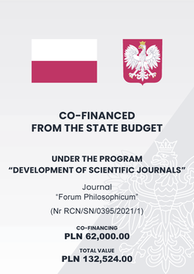- Home »
- Issues »
- 19/1 - Spring 2014 »
- Articles »
Reflections on Epictetus’ Notion of Personhood
Abstract
Epictetus’ discussion of the death of spouse and child in Encheiridion 3 raises interesting problems on the meaning of “person” in his Stoic philosophy. The author uses Epictetus’ discussion as a window into his notion of person, and weighs the strengths and weaknesses of that notion. The Stoic view of person represents an advance over pre-Stoic views. It offers us a better way to look at significant others throughout life, and helps us better to deal with their loss. Yet it falls short of being a fully satisfactory notion of person, because it does not address the fact that I am constituted as person only in relationship to others who are themselves persons.
Keywords
Cite this article
Hogg, Charles. "Reflections on Epictetus’ Notion of Personhood." Forum Philosophicum 19, no. 1 (2014): 97–106. doi:10.35765/forphil.2014.1901.05.
Bibliography
Boethius. Contra Eutychen. In De consolatione philosophiae, Opuscula theologica, edited by Claudio Moreschini, 2nd edition, 206–241. Munich; Leipzig: K. G. Saur, 2005. Epictetus. Discourses. Translated by George Long. In The Discourses of Epictetus; with the Encheiridion and Fragments, edited by George Long. New York: Hurst, 1800. http://classics.mit.edu/Epictetus/discourses.html. Epictetus. Encheiridion. Translated by Elizabeth Carter. In All the Works of Epictetus, Which Are Now Extant; Consisting of his Discourses, Preserved by Arrian, in Four Books, the “Enchiridion,” and Fragments, edited by Elizabeth Carter, 259–296. Dublin: Hulton Bradley, 1759. http://classics.mit.edu/Browse/browse-Epictetus.html. Euchologion to mega en hō periechontai kata taxin hai tōn hepta mystēriōn akolouthiai. Constantinople: En tō tou Patriarcheiou tēs Kōnstantinoupoleōs Typographeiō, 1803. Accessed 1 July 2014. http://anemi.lib.uoc.gr/metadata/0/f/8/metadata-70-0000206.tkl; http://books.google.com/books?id=Xg9YAAAAcAAJ. Everson, Stephen, ed. Psychology. Companions to Ancient Thought 2. Cambridge: Cambridge University Press, 1993. Frede, Michael. “A Notion of a Person in Epictetus.” In The Philosophy of Epictetus, edited by Andrew S. Mason and Theodore Scaltsas, 153–168. Oxford; New York: Oxford University Press, 2007. Gill, Christopher. “Is There a Concept of Person in Greek Philosophy?” In Psychology. Companions to Ancient Thought 2, edited by Stephen Everson, 166–193. Cambridge: Cambridge University Press, 1993. Long, Anthony A. “Representation and the Self in Stoicism.” In Psychology. Companions to Ancient Thought 2, edited by Stephen Everson, 102–120. Cambridge: Cambridge University Press, 1993. Lossky, Vladimir. The Mystical Theology of the Eastern Church. Crestwood, NY: St. Vladimir’s Seminary Press, 1998. Turcescu, Lucian. Gregory of Nyssa and the Concept of Divine Persons. American Academy of Religion. Oxford; New York: Oxford University Press, 2005. Zerbos, Spyridon ed. Euchologion to mega periechon tas tōn hepta mustēriōn akolouthias. 3rd ed. Venice: Tupographia Phoinix, 1869. Accessed 2 July 2014. http://dbooks.bodleian. ox.ac.uk/books/PDFs/591092833.pdf; http://books.google.com/books?id=db0UAAAAQAAJ. Reprint, Athens: Astēr, 1970; 1980; 1986; 1992. Zizioulas, John D. Communion and Otherness: Further Studies in Personhood and the Church. Edited by Paul McPartlan. London; New York: T&T Clark, 2006.




